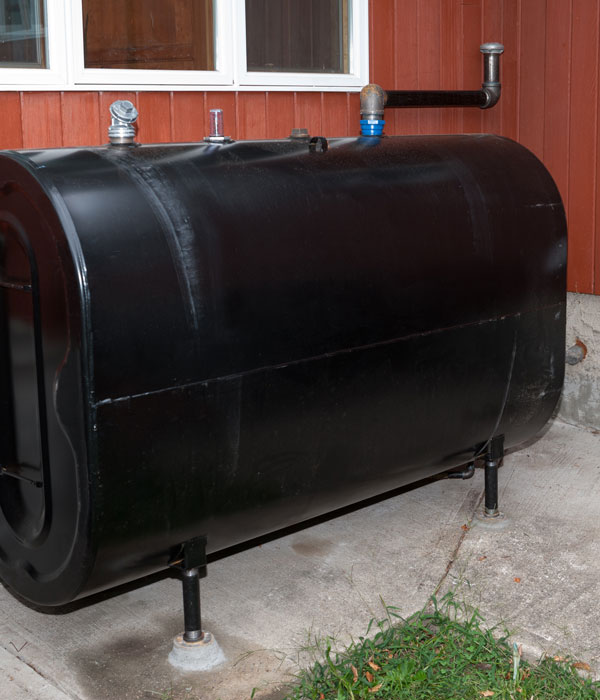Heating Oil Tank Relocation in Hampton Roads & Surrounding Areas
Heating Oil Tank Removal and Oil Tank Replacement in VA
Oil tanks can be vulnerable to outside hazards. One of the biggest hazards is fire. Oil is highly flammable, and gas is explosive. If fire and these elements mix, disaster ensues. That’s why fire-rated oil tanks were created. Here at Bogue Oil, Inc. our goal is to help you find the right option for your needs and lifestyle. Contact us today!
If your heating oil tank is leaking or if the ground around it has begun to erode or shift, you should invest in heating oil tank relocation. At Bogue Oil, Inc., we can send our experts to do a safety inspection and assessment of your tank and its location. Then we can determine if it’s in good enough shape to relocate or if you need to consider heating oil tank removal and oil tank replacement.
We work with aboveground and underground oil tanks and fuel tanks. Call us today or contact us online to learn when heating oil tank removal in Hampton Roads and surrounding areas is necessary.

What Is Heating Oil Tank Relocation?
Heating oil tank relocation is when we dig an underground oil tank out and move it to a new location, or remove and re-install an aboveground tank to another location. We might recommend this if the heating oil tank’s current location is unsafe or unstable, or even if it is inconvenient for fueling and re-filling efficiency.
We can also lift an underground oil tank to correct edge settlement, provide secondary containment, or install a new foundation for an aboveground oil tank. We also offer heating oil tank removal and oil tank replacement if we determine your existing tank is too damaged or unsafe to relocate.
Importance of Proper Oil Tank Placement for Safety and Efficiency
There are many factors to consider when deciding where heating oil tank installation or oil tank replacement should occur. We always conduct a thorough risk assessment and safety inspection before we proceed with heating oil tank relocation or oil tank replacement. We will relocate your tank to an area where, if a leak occurs, it will cause the least damage. We will not install a tank at high-risk locations like a flood zone. We also follow all legal regulations and standards about where we install or relocate a heating oil tank.
When installed inside a structure, the tank must be 1.8 m away from eaves, windows, doors, cladding, and any other part of the building that could be combustible. An underground oil tank must meet special installation requirements: a reinforced bunded tank with a protective layer of concrete around it. You need special permits and to adhere to all local and federal regulations. When relocating or installing a heating oil tank, we also consider fueling and filling efficiency. We will make sure that your tank is installed or relocated to a place where it is easy for delivery drivers to fuel it.
Common Reasons for Relocating a Heating Oil Tank
You Are Moving
Selling your home without disclosing an underground oil tank can open you to liability and litigation.Your heating oil tank is old
Heating oil tanks only last 15-20 years. An old tank becomes unsafe, and the risk of leaks increases yearly. After 15 years, you should consider heating oil tank removal or oil tank replacement.It’s in an inconvenient place
If your heating oil tank can’t be reached easily for fueling or refueling, our relocation experts can improve its efficiency by relocating it somewhere more convenient.The tank is in bad condition
If your heating oil tank or underground oil tank is wobbly, unstable, dented, corroded, inefficient, or faulty, you can’t risk having it on your property anymore. You need expert heating oil tank removal.The soil is shifting or eroding
Shifting or eroding soil can create an unstable foundation for an aboveground heating oil tank. An underground oil tank is also at risk of damage if the ground shifts or sinks, heavy traffic is overhead or frequent earthquakes occur.Steps to Take Before Heating Oil Tank Removal
#1 - Assessment
Contact your local oil tank replacement or removal contractor. They will extract all usable oil from your tank and can also do a safety inspection and assessment of the condition and health of your tank. If you’re relocating it to a new area, you want to be sure it’s sturdy enough to handle the transition.#2 - Extraction
For underground oil tanks, they must be removed by a certified professional. Your contractor will need to dig the tank out of the ground. That can be a lengthy, complex process, and can cause the cost of heating oil tank removal to increase significantly.#3 - Cleaning
Next, begin cleaning sludge from the heating oil tank. Cut open the tank and clean out the remaining sludge. The sludge can be moved to a sealed drum and can be recycled.#4 - Removal
Your contractor will then detach the pipes and remove them from the foundation. The heating oil tank can be removed whole if it is being relocated, or cut into pieces for complete heating oil tank removal.#5 - Disposal
Heating oil tanks are contaminated and must be disposed of properly at a hazardous waste site. Your contractor will take care of this for you.
Factors to Consider When Choosing a New Location
Overview of Heating Oil Tank Relocation Process
Initial consultation and assessment
We come onsite and inspect your heating oil tank and assess its condition. We’ll let you know if relocation is possible, or if it would be too risky or unsafe. If that’s the case, we can offer heating oil tank removal and new heating oil tank installation.New location
Next, we’ll discuss the new location for your heating oil tank placement. We will level the ground and lay concrete blocks.Drain, clean, and dismantle
Then we’ll drain all usable oil from the tank, we’ll disconnect the pipes from the foundation. If we relocate it, we will move it to its new location. If we’re disposing of it, we’ll dismantle it.Installation
Then we’ll re-install the heating oil tank at its new location. We’ll hook it up, inspect it, and then test it. Finally, we’ll re-fill it with heating oil fuel for you.Care and maintenance
Finally, we’ll give you tips and advice on care and maintenance that will extend the lifespan of your heating oil tank.